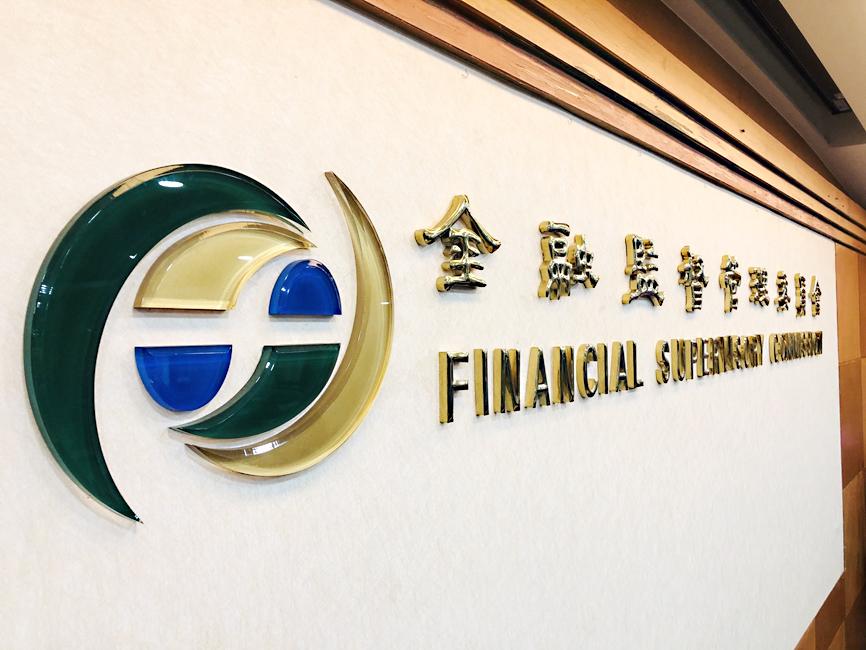The Financial Supervisory Commission (FSC) is to tighten regulations on local financial companies marketing to the elderly, after finding that many banks and insurers last year sold unsuitable products to older customers without a proper risk assessment, the regulator said last week.
The commission plans to implement stricter punishment for financial companies that inappropriately sell products to older customers, and would focus on firms’ marketing activities in its review this year of companies’ treatment of customers, it said.
The FSC is considering asking banks to collect complaints from older customers, and set up databases to systematically review and improve their internal controls and marketing practices, it said.

Photo: Kelson Wang, Taipei Times
The commission might also order the Financial Ombudsman Institution (FOI) to establish a “database of financial exploitation” to collect more data on inappropriate sales to older customers, it added.
The commission last year examined 10 banks, six insurers, six credit unions and three securities companies. It found that some companies sold products to older customers without properly assessing their risk appetite to boost sales, the commission said.
Some exaggerated the returns of products or incorrectly guaranteed profits, while some lured customers to buy investment-linked policies with credit cards so that their internal control department could not review the source of the premium, the commission said.
Some companies categorized older customers as “professional investors,” so that they could sell them complex products such as high-yield bonds or structured notes, even though the practice was not in the customers’ interest, as they would not be able to seek assistance from the FOI in any disputes, because professional investors are not protected by the Financial Consumer Protection Act (金融消費者保護法), the commission said.
The Banking Bureau revised its guidance for local banks last week, requiring them to improve their know-your-customer (KYC) and know-your-product (KYP) practices, it said.
The bureau is to give banks six months to adapt to the new guidance, it added.
The Insurance Bureau is also considering to revise its regulations to improve insurers’ KYC and KYP practices, it said.
The commission has asked banks not to introduce loan programs to older customers over the telephone and insurers to record the whole process of their sales agents selling products to older customers.

Sweeping policy changes under US Secretary of Health and Human Services Robert F. Kennedy Jr are having a chilling effect on vaccine makers as anti-vaccine rhetoric has turned into concrete changes in inoculation schedules and recommendations, investors and executives said. The administration of US President Donald Trump has in the past year upended vaccine recommendations, with the country last month ending its longstanding guidance that all children receive inoculations against flu, hepatitis A and other diseases. The unprecedented changes have led to diminished vaccine usage, hurt the investment case for some biotechs, and created a drag that would likely dent revenues and

Global semiconductor stocks advanced yesterday, as comments by Nvidia Corp chief executive officer Jensen Huang (黃仁勳) at Davos, Switzerland, helped reinforce investor enthusiasm for artificial intelligence (AI). Samsung Electronics Co gained as much as 5 percent to an all-time high, helping drive South Korea’s benchmark KOSPI above 5,000 for the first time. That came after the Philadelphia Semiconductor Index rose more than 3 percent to a fresh record on Wednesday, with a boost from Nvidia. The gains came amid broad risk-on trade after US President Donald Trump withdrew his threat of tariffs on some European nations over backing for Greenland. Huang further

CULPRITS: Factors that affected the slip included falling global crude oil prices, wait-and-see consumer attitudes due to US tariffs and a different Lunar New Year holiday schedule Taiwan’s retail sales ended a nine-year growth streak last year, slipping 0.2 percent from a year earlier as uncertainty over US tariff policies affected demand for durable goods, data released on Friday by the Ministry of Economic Affairs showed. Last year’s retail sales totaled NT$4.84 trillion (US$153.27 billion), down about NT$9.5 billion, or 0.2 percent, from 2024. Despite the decline, the figure was still the second-highest annual sales total on record. Ministry statistics department deputy head Chen Yu-fang (陳玉芳) said sales of cars, motorcycles and related products, which accounted for 17.4 percent of total retail rales last year, fell NT$68.1 billion, or

HSBC Bank Taiwan Ltd (匯豐台灣商銀) and the Taiwan High Prosecutors Office recently signed a memorandum of understanding (MOU) to enhance cooperation on the suspicious transaction analysis mechanism. This landmark agreement makes HSBC the first foreign bank in Taiwan to establish such a partnership with the High Prosecutors Office, underscoring its commitment to active anti-fraud initiatives, financial inclusion, and the “Treating Customers Fairly” principle. Through this deep public-private collaboration, both parties aim to co-create a secure financial ecosystem via early warning detection and precise fraud prevention technologies. At the signing ceremony, HSBC Taiwan CEO and head of banking Adam Chen (陳志堅)